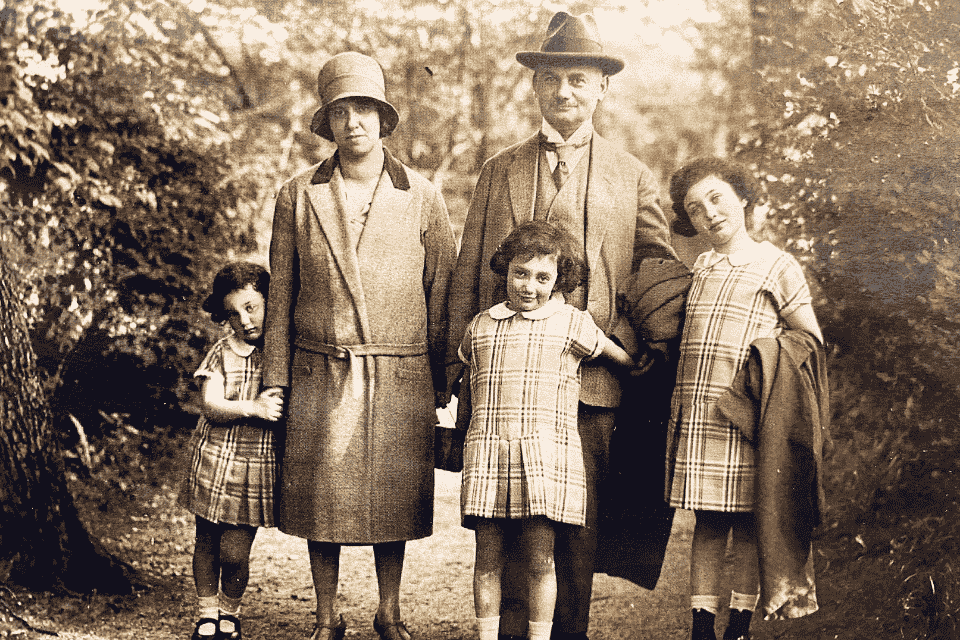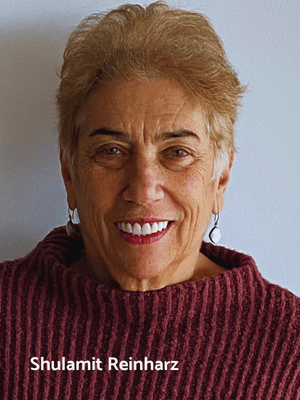Shulamit and Jehuda Reinharz Establish Fund to Research Women, Holocaust and Gender

(L-R) Chava Low (survived and lived in Israel); Therese Gern Strauss (mother of the three girls; murdered in Auschwitz, 1942, after being deported to Concentration Camp Gurs in France, 1940); Heinrich Strauss (lawyer, father of the three girls, died in Concentration Camp Gurs in France in 1941 after being deported to Gurs in 1940); in front: Shulamit’s mother, Ilse Strauss Rothschild; Shulamit Strauss Treidel, Shulamit’s mother's older sister, died in Palestine of illness before Israel became a state). Photo taken in Germany where Shulamit’s mother was born and grew up.
Photo Credit: courtesy of Shulamit Reinharz
By Amy Powell
 Shortly after Shulamit Reinharz completed her book, Hiding in Holland: A Resistance Memoir detailing her father, Max Rothschild’s, experiences in the Holocaust, she turned her attention to her mother, Ilse Rothschild. While her father left extensive papers, “five to six feet of documents in boxes,” her mother left little and didn’t talk about her experiences.
Shortly after Shulamit Reinharz completed her book, Hiding in Holland: A Resistance Memoir detailing her father, Max Rothschild’s, experiences in the Holocaust, she turned her attention to her mother, Ilse Rothschild. While her father left extensive papers, “five to six feet of documents in boxes,” her mother left little and didn’t talk about her experiences.
“It’s a real challenge to write a biography of a woman who didn’t leave much paper,” said Reinharz, the founding director of the Hadassah-Brandeis Institute.
In the process of trying to piece together her mother’s story, Reinharz often turns to the context of the times and what is known about how women experienced the Holocaust. It reinforces the need for research on gender and the Holocaust, some of which was pioneered under her leadership at HBI. One aspect of this work was HBI’s Project on Families, Children and the Holocaust that ran from 2009 to 2013, led by noted Holocaust scholar and HBI Research Associate Joanna Beata Michlic. “More must be known about how women and families experienced the Holocaust,” Reinharz said.
 For this reason, Shulamit and Jehuda Reinharz, former president of Brandeis University, decided to give $100,000 to establish the Ilse Hertha Strauss Rothschild Research Awards on Women, Gender and the Holocaust, named for Shulamit’s
For this reason, Shulamit and Jehuda Reinharz, former president of Brandeis University, decided to give $100,000 to establish the Ilse Hertha Strauss Rothschild Research Awards on Women, Gender and the Holocaust, named for Shulamit’s  mother. Shulamit’s brother and sister, Jonathan and Tova Rothschild, and her daughter Naomi Reinharz, also contributed to the fund in memory of their mother and grandmother. The first two awards in this category were part of the 2025 HBI Research Awards. Today, July 1, the applications for 2026 Research Awards opens, including opportunities for the Ilse Hertha Strauss Rothschild Research Awards on Women, Gender and the Holocaust.
mother. Shulamit’s brother and sister, Jonathan and Tova Rothschild, and her daughter Naomi Reinharz, also contributed to the fund in memory of their mother and grandmother. The first two awards in this category were part of the 2025 HBI Research Awards. Today, July 1, the applications for 2026 Research Awards opens, including opportunities for the Ilse Hertha Strauss Rothschild Research Awards on Women, Gender and the Holocaust.
In 2025, HBI gave 14 Research Awards totaling $61,000. Each year the HBI Research Award program funds work selected by our Academic Advisory Council of international experts to support research or artistic projects across a range of disciplines. Since 1997, HBI has funded more than 400 research grants totaling approximately $1.2 million. A complete list of projects is detailed on HBI’s website.
Another motivation for the Reinharzes making their gift was to show support for Brandeis’ new interim president, Arthur Levine. “I wanted to fund something that HBI already does very well, and we wanted to welcome Arthur to the university. We put all this together with the research I was reading on women and the Holocaust and decided to do this to honor my mother,” Reinharz said.
Lisa Fishbayn Joffe, the current director of HBI who holds Shulamit Reinharz Directorship, said, “I am so grateful to the Reinharzes for this gift in support of the HBI Research Awards Program. Shula has paved the way in developing the field of women, gender, and the Holocaust, at Brandeis and in the wider academic world, and I’m delighted that this gift fund will allow us to nurture a new generation of scholars in the field. The untold stories of Jewish women during and after the Holocaust are still being uncovered, and this gift will allow us to support those doing this essential work.”
The first two of those awards were given this year to novelist Judy Batalion for her new book, The Last Woman of Warsaw, and History Ph.D. candidate, Sarah Ernst for their research “I have been saved for the better part of my life, namely twenty-seven years, by two women and the town of Malvern”: Queer Communities in the Shadows of the Holocaust.
Reinharz was thrilled to learn that one of the first Research Awards in the new fund will go to Batalion, whose past work on women and the Holocaust illustrates the power of the HBI Research Award program. In 2010, Batalion received the first of three HBI Research Awards to study and translate a Yiddish memoir about women’s resistance, Fruen in di Ghetto. The work ultimately led to her most recent book, The Light of Days: The Untold Story of Women Resistance Fighters in Hitler’s Ghettos, a bestseller favorably reviewed in nearly all the mainstream media.
Batalion’s new project, set in Warsaw in the late 1930s, is a novel that explores Jewish women’s dynamic roles in a culture of Jewish creative fluorescence alongside growing antisemitism. It aims to overturn the generally-held idea that Polish Jewry was all “Fiddler on the Roof,” she said. Instead, Batalion will paint a picture of the vibrant art, cultural and political worlds that existed in Warsaw at the time - worlds that resonate today.
“I am exceptionally honored to receive one of the first Ilse Rothschild awards. I cannot overstate the significance of HBI's support. Without it, I simply would never have researched and written my last two books. I am deeply grateful for the Institute's continued support of my work on Jewish women and the Holocaust,” Batalion said.
Ernst's project looks at the ways that writing the Holocaust histories of queer bodies shapes the trajectory and impact of future research on persecution, survival, and remembrance. It encompasses not only the explicit persecution under the Nazi regime, but discrimination among different social groups and on the interpersonal level.
In the proposal Ernst wrote, “This research foregrounds what is often left out, which is a more thorough investigation of the intersectionality of queer experiences, considering other identities such as race, class, gender, and (dis)ability. It also centers on queer bodies, those who were targeted not only for their (non-hetero) sexual desires, but those whose physical existence – whether gender performativity or kinship – did not conform to the prescribed societal ‘norm.’” Ernst will look at Holocaust refugees and survivors, and their journeys of belonging within various communities that are forged/informed by the Holocaust and its legacies.
Amy Powell is the senior assistant director of HBI.
If you are interested in funding an HBI Research Award, please contact Amy Powell, HBI Senior Assistant Director.